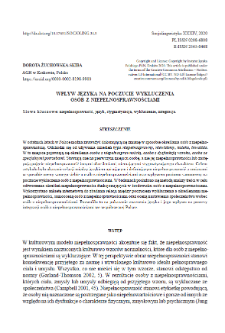- Search in all Repository
- Literature and maps
- Archeology
- Mills database
- Natural sciences
Advanced search
Advanced search
Advanced search
Advanced search
Advanced search

Object
Title: The Influence of Language on the Feeling of Exclusion of People with Disabilities
Publisher:
Instytut Języka Polskiego Polskiej Akademii Nauk
Place of publishing:
Abstract:
In recent years, Poland has seen a change in the identification of people with disabilities. It is noticeableto abandon the use of the terms disabled, blind, cripple, invalid. In this place are the terms a person witha disability, a person with special needs. This indicates a tendency to deviate from the definition of disabilityor its type, in the direction of putting the person first and replacing the concept of disability withother terms that do not have a stigmatizing character. The goal of the article was to show the relationshipbetween the changing language describing and defining disability and changes in the perception of peoplewith disabilities and their impact on the sense of exclusion of people with disabilities. The research useda method of content analysis to recreate disability terms functioning in the opinion of people with disabilitiesin social discourse and an online survey was used to examine the relationship between the sense of exclusionand disability terms, ways of perceiving oneself and the assessment of the society’s attitude towardspeople with disabilities. This allowed to show the meaning of the language and its impact on the processesof integration of people with disabilities in contemporary Poland.
Relation:
Volume:
Start page:
End page:
Detailed Resource Type:
Format:
Resource Identifier:
10.17651/SOCJOLING.34.5 ; oai:rcin.org.pl:164385
Language:
Language of abstract:
Rights:
Terms of use:
Access:
Object collections:
- Digital Repository of Scientific Institutes > Partners' collections > Institute of Polish Language PAS > Serials
- Digital Repository of Scientific Institutes > Partners' collections > Institute of Polish Language PAS > Filds of science > Humanities > Linguistics
- Digital Repository of Scientific Institutes > Partners' collections > Institute of Polish Language PAS > Filds of science > Humanities > Linguistics > Sociolinguistics
- Digital Repository of Scientific Institutes > Partners' collections > Institute of Polish Language PAS > Offprint
- Digital Repository of Scientific Institutes > Literature > Journals/Articles
Last modified:
Mar 3, 2021
In our library since:
Mar 2, 2021
Number of object content downloads / hits:
94
All available object's versions:
https://rcin.org.pl./publication/198587
Show description in RDF format:
Show description in RDFa format:
Show description in OAI-PMH format:
| Edition name | Date |
|---|---|
| Wpływ języka na poczucie wykluczenia osób z niepełnosprawnościami / Żuchowska-Skiba, Dorota | Mar 3, 2021 |
Objects Similar
Latocha, Sebastian
Brožovičová, Klára
Pamuła, Natalia
Poczta, Walenty
Székely, Vladimír Novotný, Ján Michniak, Daniel

 INSTYTUT ARCHEOLOGII I ETNOLOGII POLSKIEJ AKADEMII NAUK
INSTYTUT ARCHEOLOGII I ETNOLOGII POLSKIEJ AKADEMII NAUK
 INSTYTUT BADAŃ LITERACKICH POLSKIEJ AKADEMII NAUK
INSTYTUT BADAŃ LITERACKICH POLSKIEJ AKADEMII NAUK
 INSTYTUT BADAWCZY LEŚNICTWA
INSTYTUT BADAWCZY LEŚNICTWA
 INSTYTUT BIOLOGII DOŚWIADCZALNEJ IM. MARCELEGO NENCKIEGO POLSKIEJ AKADEMII NAUK
INSTYTUT BIOLOGII DOŚWIADCZALNEJ IM. MARCELEGO NENCKIEGO POLSKIEJ AKADEMII NAUK
 INSTYTUT BIOLOGII SSAKÓW POLSKIEJ AKADEMII NAUK
INSTYTUT BIOLOGII SSAKÓW POLSKIEJ AKADEMII NAUK
 INSTYTUT CHEMII FIZYCZNEJ PAN
INSTYTUT CHEMII FIZYCZNEJ PAN
 INSTYTUT CHEMII ORGANICZNEJ PAN
INSTYTUT CHEMII ORGANICZNEJ PAN
 INSTYTUT FILOZOFII I SOCJOLOGII PAN
INSTYTUT FILOZOFII I SOCJOLOGII PAN
 INSTYTUT GEOGRAFII I PRZESTRZENNEGO ZAGOSPODAROWANIA PAN
INSTYTUT GEOGRAFII I PRZESTRZENNEGO ZAGOSPODAROWANIA PAN
 INSTYTUT HISTORII im. TADEUSZA MANTEUFFLA POLSKIEJ AKADEMII NAUK
INSTYTUT HISTORII im. TADEUSZA MANTEUFFLA POLSKIEJ AKADEMII NAUK
 INSTYTUT JĘZYKA POLSKIEGO POLSKIEJ AKADEMII NAUK
INSTYTUT JĘZYKA POLSKIEGO POLSKIEJ AKADEMII NAUK
 INSTYTUT MATEMATYCZNY PAN
INSTYTUT MATEMATYCZNY PAN
 INSTYTUT MEDYCYNY DOŚWIADCZALNEJ I KLINICZNEJ IM.MIROSŁAWA MOSSAKOWSKIEGO POLSKIEJ AKADEMII NAUK
INSTYTUT MEDYCYNY DOŚWIADCZALNEJ I KLINICZNEJ IM.MIROSŁAWA MOSSAKOWSKIEGO POLSKIEJ AKADEMII NAUK
 INSTYTUT PODSTAWOWYCH PROBLEMÓW TECHNIKI PAN
INSTYTUT PODSTAWOWYCH PROBLEMÓW TECHNIKI PAN
 INSTYTUT SLAWISTYKI PAN
INSTYTUT SLAWISTYKI PAN
 SIEĆ BADAWCZA ŁUKASIEWICZ - INSTYTUT TECHNOLOGII MATERIAŁÓW ELEKTRONICZNYCH
SIEĆ BADAWCZA ŁUKASIEWICZ - INSTYTUT TECHNOLOGII MATERIAŁÓW ELEKTRONICZNYCH
 MUZEUM I INSTYTUT ZOOLOGII POLSKIEJ AKADEMII NAUK
MUZEUM I INSTYTUT ZOOLOGII POLSKIEJ AKADEMII NAUK
 INSTYTUT BADAŃ SYSTEMOWYCH PAN
INSTYTUT BADAŃ SYSTEMOWYCH PAN
 INSTYTUT BOTANIKI IM. WŁADYSŁAWA SZAFERA POLSKIEJ AKADEMII NAUK
INSTYTUT BOTANIKI IM. WŁADYSŁAWA SZAFERA POLSKIEJ AKADEMII NAUK




































